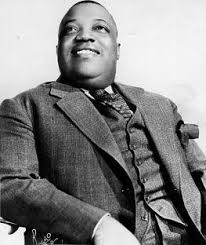Let the Fat Man Sing
by Con Chapman
There is a prejudice in our culture that works its pernicious effects against both the individuals who are its targets, and our society as a whole. I refer to the widespread, if unspoken, discrimination against fat male singers.

For every Ruben Studdard, there are ten Mick Jaggers and, considered merely in terms of avoirdupois, the two sides of that scale would probably balance. We view ourselves as more enlightened than our forebears, but in this instance at least, older generations were more open-minded than us.
Take Big Joe Turner, for example. He weighed more than 300 pounds, and yet in 1954 at the age of 43 he became a favorite of American teens with “Shake, Rattle and Roll” and other early rock and roll hits. Imagine, if you can, an overweight middle-aged man topping the pop charts today. I can't.

Jimmy Rushing
Before Turner there was Jimmy Rushing, who like Turner sang with Count Basie's band. He was known as “Mr. Five by Five” because he was about as wide as he was tall. The heirs of these two patriarchs include Antoine “Fats” Domino and, in a musical example of the inevitable degeneration of great lineages, Chubby Checker. Still, the truth remains: in singers as in steaks, flavor is enhanced by fat.

Antoine “Fats” Domino
The connection between girth and singing greatness is a matter of simple physics. Your typical anorexic rock star emits a thin, reedy sound that matches his frame, while the overweight blues shouter produces a richer, mellower timbre. It is a piccolo to a tuba.
Solomon Burke
The subject of musical quality as a function of weight is topical due to the passing last week of Solomon Burke. At Burke's death the 400 pound milestone was far away in his rear-view mirror, but his career spanned five decades, unlike the mayfly-like life spans of many raspy rock singers. When a black musician whose music is unknown to the general public passes away, it is typical to praise him by citing the number of white rockers who covered his hits, and Burke is no exception.

Burke, in full “King of Rock and Soul” regalia.
Obituaries referred to The Rolling Stones' version of his song “Everybody Needs Somebody to Love” (they recorded others, including “Cry to Me” and “Pain in My Heart”), but while imitation is sincere flattery, in this case it simply demonstrates the superiority of originals to copies. Burke didn't make millions as his white imitators did, and he kept body and soul (a lot of both) together by day jobs including mortician and preacher. When Burke introduces the song with the spoken welcome to his listeners, you know he's been in the pulpit before. When Mick Jagger tries to pull it off, it is the agnostic's version of “Amazing Grace.”

Pope John Paul II: “Ev-e-ry bo-dy . . . needs some-body!”
While primarily a soul singer, Burke recorded country tunes as well, including “Just Out of Reach of My Two Empty Arms,” an early hit for Patsy Cline, and released a country album in 2006. His tastes in religion were catholic with both a lower and upper case C: He recorded gospel albums early in his career, but enjoyed a special relationship with the Roman Catholic Church throughout his life. You may find it hard to picture “Soul Summit” echoing through the halls of the Vatican, but Pope John Paul II was a fan.
“Church ain't over 'til the fat lady sings” is an old Southern expression that Burke no doubt heard growing up. Juvenile obesity is a problem, I agree, but without fat kids, where will the singing fat men of the future come from?
|
0
favs |
989 views
0 comments |
649 words
All rights reserved. |
Author's Note
The author has not attached a note to this story.
Other stories by Con Chapman
Tags
This story has no tags.
Groups
-
Non-Fiction

Public group31 members
